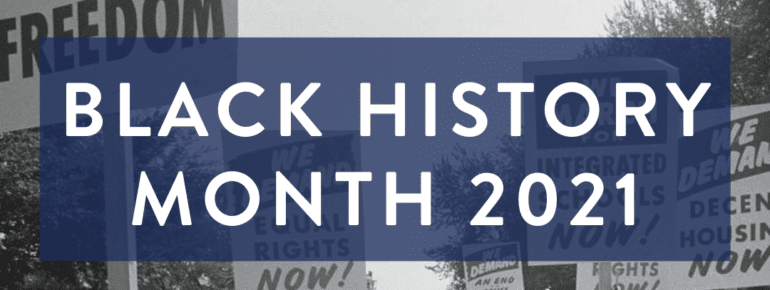Leadership
Black History Month 2021

Celebrating Black History Month in a meaningful way is critical to ensuring diversity and inclusion is at the forefront of your organization’s priorities. As leaders, it’s important to set standards of how to eradicate discrimination and bias and encourage the inclusion of all employees. By asking everyone to participate in Black History Month in at least one way, you are providing educational opportunities while celebrating Black leaders in our local communities.
History
According to The History Channel, Black History Month began in 1915, half a century after the Thirteenth Amendment abolished slavery in the United States. In September 1915, Harvard-trained historian Carter G. Woodson and prominent minister Jesse E. Moorland founded the Association for the Study of Negro Life and History (ASNLH), an organization dedicated to researching and promoting achievements by Black Americans and other peoples of African descent.
Known today as the Association for the Study of African American Life and History (ASALH), the group sponsored a national Negro History week in 1926, choosing the second week of February to coincide with the birthdays of Abraham Lincoln and Frederick Douglass. The event inspired schools and communities nationwide to organize local celebrations, establish history clubs and host performances and lectures. By the late 1960s, thanks in part to the civil rights movement and a growing awareness of Black identity, Negro History Week had evolved into Black History Month on many college campuses. President Gerald Ford officially recognized February as Black History Month in 1976, and every sitting president has done so since.
How To Celebrate Black History Month in Your Workplace
- Educate Your Employees – For employees that may not know the significance of Black History Month, education is a great first step. This can be done through book clubs, movie suggestions, bringing in guest speakers or holding diversity and inclusion training seminars– anything that fits your organization’s culture. By hearing other peoples’ perspectives, employees can learn new insights and gain a better understanding of why they should celebrate.
- Share and Support Black-owned Organizations – Research shows that Black-owned businesses often struggle to survive due to a lack of accessible capital. One way to support them is to buy direct or share their stories on social media. If you personally can’t make a purchase, sharing their business can inspire one of your followers to. There are a few websites, like WeBuyBlack, to help you locate these businesses. Exude will also be sharing some Philadelphia-based Black-owned businesses throughout the month. Additionally, volunteering with Black-led or Black-run non-profits can inspire motivation and help employees connect with both their coworkers and their local communities.
- Advocate Through Your Business – Hiring diverse talent is an excellent way of showing both potential candidates and your employees that diversity and inclusion is a priority for your organization. Partners, employees, and the community want to see themselves represented in the companies that they work with and buy from. Additionally, make sure you have internal processes and policies to recognize and reward diverse groups, for example, implementing a 360-degree peer recognition program. Executive boards and leadership tend to be less diverse, so by implementing this type of program in your organization, you are diversifying the parties responsible for giving feedback and increasing satisfaction.
- Make it a Company-Wide Effort – Whatever your organization chooses to do, encourage all employees to participate and most importantly, don’t single anyone out. You don’t want to tokenize your Black employees by forcing them to do all the planning and celebrating. In order to truly be inclusive, employees of all backgrounds should learn and take part in these activities.
Philadelphia-Area Organizations
While we will be highlighting different categories on our social media channels each week, here is a total list of every organization we plan to feature:
Books
- Amalgam Comics & Coffeehouse – After opening in 2015, Amalgam’s owner Ariell Johnson became the first Black female comic book store owner on the East Coast and sells multiple comics with Black female heroes. In addition to selling books, Amalgam hosts events and serves as an inclusive space for the local Frankford community.
- Hakim’s Bookstore & Gift Shop – Located in West Philadelphia, Hakim’s Bookstore is the first and oldest African American bookstore on the East Coast. Its founder, Dawud Hakim, opened the store in 1959 to help the community learn about Black history and although he passed away in 1997, Hakim’s continues to honor his legacy.
- Harriet’s Bookshop – Located in Fishtown, Harriet’s was named after the heroic Harriet Tubman. The collection at Harriett’s celebrates the ideas of female artists and activists who are doing work to increase awareness around social injustice. Following the death of George Floyd last summer, Harriet’s Bookshop’s owner Jeannine Cook donated books to the local community to help educate residents.
Food
- Black and Mobile (Delivery App) – Launched in 2019, Black and Mobile is a food delivery service that aims to highlight underrepresented businesses in urban communities and lower unemployment rates by hiring local employees. The app locates all black-owned businesses and adds them to their platform, making it easier for customers to find them. Founded by David Cabello, a former Shippensburg University business student, Black and Mobile was started in Philly but also now serves Atlanta, Baltimore and Detroit.
- Booker’s Restaurant and Bar – Located in Cedar Park, Booker’s brings Southern flair and brunch to its West Philadelphian community. The name comes from Booker Wright, a Black waiter at a white-only restaurant in 1960s Mississippi. He spoke out about his experience in a documentary and as a result, lost his job, experienced police brutality and had his own restaurant firebombed. Booker’s Restaurant and Bar focuses on celebrating diversity.
- Franny Lou’s Porch – Named after two influential women in the Civil Rights movement, Franny Lou’s serves as a warm space to engage in community activism and cultural awareness, as well as connect with others and rest. The cafe serves local and organic food and practices low-waste and composting. Franny Lou’s prides itself in being the “only conflict-free & organic cafe in town”, located in Kensington.
- Ms. Tootsie’s – Located on South Street off of Broad, owner KeVen Parker named Ms. Tootsie’s after his mom, who earned the nickname from her love of Tootsie Rolls. Ms. Tootsies is known for its Food Network-approved soul food, and for opening its doors to the local community.
Fashion/Apparel
- American Hats LLC – Philadelphia, among other major cities in the 19th and 20th centuries, was filled with hat-making millneries. S&S Hat Factory, which has a history dating back to 1923, is the only one that remained open. American Hats LLC purchased the company and much like the S&S of old, American Hats LLC was created with the same idea and goal in mind: “provide a quality product and create an outstanding customer experience.” Located in Bridesburg, American Hats LLC looks forward to leading the way in revitalizing the millinery industry and rejuvenating people’s desire to once again wear outstandingly stylish hats.
- Damari Savile – Co-founded by former Eagles’ safety Malcolm Jenkins, Damari Savile aims to provide a luxury fashion experience at a more affordable price. The custom pieces come in a variety of colors and allow clients to personalize it to fit their individual styles while incorporating Black art, pop culture and history. Damari Savile is located in the Old City neighborhood of the city.
- Dolly’s Boutique & Consignment – Dolly’s, located in both Mt. Airy and now the Fashion District, carries women’s clothing for all sizes (extra small through triple extra-large), ages and budgets. Some of their well-known clientele includes City Councilwomen Cherelle Parker and Maria Quinones Sanchez, TV personalities Sherri Shepherd and Niecy Nash, and singer Macy Gray.
Other/Non-Profits
- Ceramic Concept – That first began as a mobile, Instagram-based pottery line called ThreetCeramics, Ceramic Concept will be one of the only Black-owned pottery stores in Philadelphia. Founder Stefani Threet’s new store will also feature other artists’ works and is scheduled to open in February 2021, just in time for Black History Month.
- Girls’ Auto Clinic Repair Center – Located in Upper Darby near 69th street station (just outside of the West Philadelphia border) Girls’ Auto Clinic is a woman-owned and operated auto repair clinic. Founder Patrice Banks was tired of being taken advantage of in a male-dominated industry, enrolled in automotive technology school after college and founded GAC to empower and educate women. GAC also has Clutch, a full-service beauty bar for women to relax and unwind while waiting for their cars to be finished.
- Black Doctors COVID-19 Consortium – The Black Doctors COVID-19 Consortium to reduce the incidence of disease and death from coronavirus in African-Americans through education and advocacy. As Black people are being diagnosed and are dying from coronavirus at higher rates than other groups, the Black Doctors Consortium combats this through free mobile testing sites around the city and now through vaccinations.
- Coded by Kids – Based in University City, Coded by Kids provides young people between the ages of 8 and 18, from underrepresented groups with software development, digital design, computer science, and tech startup-focused entrepreneurship education programs.
- Philadelphia Urban Creators – Founded in 2010 by local youth, Philly Urban Creators transforms neglected landscapes in North Philadelphia into dynamic safe spaces that foster connectivity, self-sufficiency, and innovation. The nonprofit relies on urban agriculture, interest-based learning, artistic expression, restorative justice, and celebration to foster neighborhood stabilization and youth development. Their home base is Life Do Grow, a creative hub situated in North Central Philadelphia. The two-acre space includes an urban farm, a public park, outdoor classrooms, community spaces, and a co-creation area for several small businesses.
For more resources on celebrating diversity in your organization, year-round, please fill out the form below:
Additional Resources:







